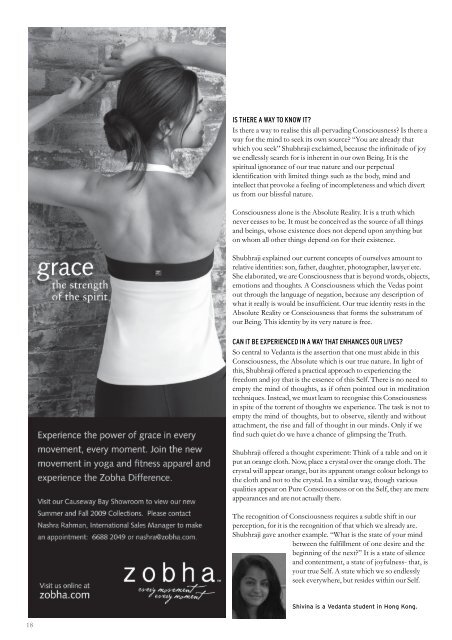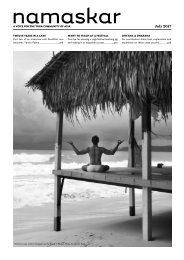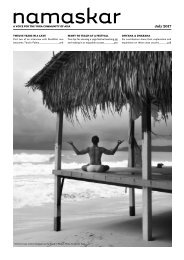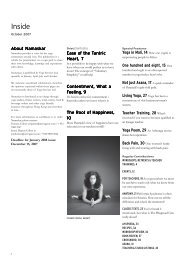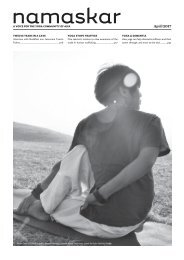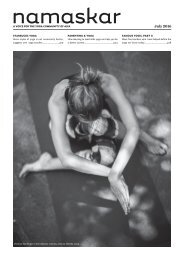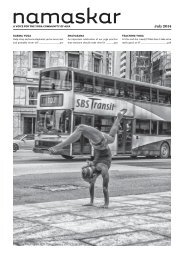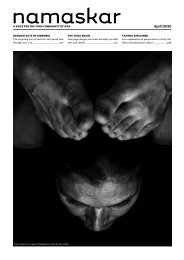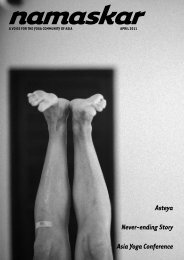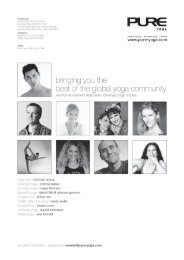You also want an ePaper? Increase the reach of your titles
YUMPU automatically turns print PDFs into web optimized ePapers that Google loves.
IS THERE A WAY TO KNOW IT?<br />
Is there a way to realise this all-pervading Consciousness? Is there a<br />
way for the mind to seek its own source? “You are already that<br />
which you seek” Shubhraji exclaimed, because the infinitude of joy<br />
we endlessly search for is inherent in our own Being. It is the<br />
spiritual ignorance of our true nature and our perpetual<br />
identification with limited things such as the body, mind and<br />
intellect that provoke a feeling of incompleteness and which divert<br />
us from our blissful nature.<br />
Consciousness alone is the Absolute Reality. It is a truth which<br />
never ceases to be. It must be conceived as the source of all things<br />
and beings, whose existence does not depend upon anything but<br />
on whom all other things depend on for their existence.<br />
Shubhraji explained our current concepts of ourselves amount to<br />
relative identities: son, father, daughter, photographer, lawyer etc.<br />
She elaborated, we are Consciousness that is beyond words, objects,<br />
emotions and thoughts. A Consciousness which the Vedas point<br />
out through the language of negation, because any description of<br />
what it really is would be insufficient. Our true identity rests in the<br />
Absolute Reality or Consciousness that forms the substratum of<br />
our Being. This identity by its very nature is free.<br />
CAN IT BE EXPERIENCED IN A WAY THAT ENHANCES OUR LIVES?<br />
So central to Vedanta is the assertion that one must abide in this<br />
Consciousness, the Absolute which is our true nature. In light of<br />
this, Shubhraji offered a practical approach to experiencing the<br />
freedom and joy that is the essence of this Self. There is no need to<br />
empty the mind of thoughts, as if often pointed out in meditation<br />
techniques. Instead, we must learn to recognise this Consciousness<br />
in spite of the torrent of thoughts we experience. The task is not to<br />
empty the mind of thoughts, but to observe, silently and without<br />
attachment, the rise and fall of thought in our minds. Only if we<br />
find such quiet do we have a chance of glimpsing the Truth.<br />
Shubhraji offered a thought experiment: Think of a table and on it<br />
put an orange cloth. Now, place a crystal over the orange cloth. The<br />
crystal will appear orange, but its apparent orange colour belongs to<br />
the cloth and not to the crystal. In a similar way, though various<br />
qualities appear on Pure Consciousness or on the Self, they are mere<br />
appearances and are not actually there.<br />
The recognition of Consciousness requires a subtle shift in our<br />
perception, for it is the recognition of that which we already are.<br />
Shubhraji gave another example. “What is the state of your mind<br />
between the fulfillment of one desire and the<br />
beginning of the next?” It is a state of silence<br />
and contentment, a state of joyfulness- that, is<br />
your true Self. A state which we so endlessly<br />
seek everywhere, but resides within our Self.<br />
Shivina is a Vedanta student in Hong Kong.<br />
18


